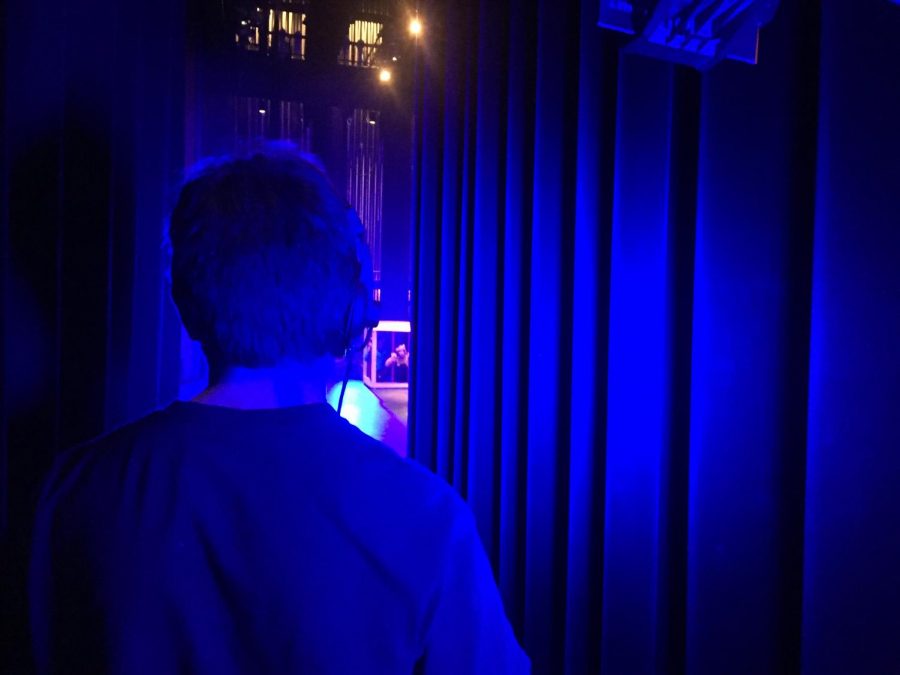Staying late doesn’t have to be a drag
Technicians work late because “pain is temporary, tech is forever”
Photo by Photo by Alex Ketcham
A technician looks on to the stage during a November 8 performance of “Seussical”. Technicians have been working since September and have been staying late after school in order to make the show a success.
Staying at school until nine or ten at night, four to five days a week, may seem daunting to some students, but for the student technicians running a theatre production, this is just a normal schedule.
During a typical tech rehearsal for a drama club production, actors are dismissed around 6:30. For some technicians, that’s when the real work begins of finishing set pieces, fixing light and sound cues, and making scene transitions more smooth, according to Rachel Moore, senior technical theatre club president.
“It depends on my position for the show because if I’m doing props or paint then I’m always there last for about two or three hours after,” Moore said. “For this show, [Seussical], I’m stage manager, so it has kind of been a hit or miss on whether I stay or not, but the few nights I have been staying it’s about two to three hours.”
Staying so late to help successfully put on a show might seem over the top, but it’s all about matching the quality of work that actors do on stage, said Charlie Frampton, junior technical theatre club vice-president.
“As technicians we understand that the actors spend a lot of time on the show making it really great and and we want to match that,” Frampton said. “But we only have so much time to do what the [actors] do, which is why we stay late so we can be on the same level actors visually and design wise.”
None of the work that happens behind the scenes could happen with just one person, which is why every technician must work collaboratively to create the end product of a professional looking theatre production, Frampton said.
“A lot of it tends to be working as a team especially backstage and accepting other people’s ideas and working collaboratively to maker the show as best as can be,” Frampton said.”
Even though staying late can seem difficult from a motivational perspective, the work being done doesn’t seem like work to the technicians as they enjoy what they are staying late to do, Moore said.
“[When] we had a set piece break [during a recent rehearsal], Charlie [Frampton] and I were two people who had nothing to do with it but we were the ones who stayed to fix it, but it was fine because I didn’t get to build a lot this show so it was kind of fun for me to build again,” Moore said.
Even when things go wrong, technicians still find ways to remain optimistic, as one time, Moore accidentally got nails stuck in her hand during strike, the time where crew dismantles the set, of Catch Me if You Can, the 2016 school musical. Moore had to stay to finish until 2:00 am, but brushed the pain off because “pain is temporary, tech is forever,” Moore said.
“It was just chance that it happened, it was just an unfortunate mishap,” Moore said. “It didn’t really reflect on my tech experience at all, it just kind of happened.”
On top of all of this time in the theater, academic responsibilities still linger and still exist, but technicians find ways to finish their school work in order to continue being a part of the show, Frampton said.
“Keeping up with schoolwork can sometimes be a problem but the way I get through that is I work through my lunch or I’ll do as much as I can during school and when I get home you kid of just have to bite the bullet and finish your homework even if you have to stay up until midnight to do it,” Frampton said.
In the end, through whatever setbacks technicians find themselves in, they are able to persevere through them to create the end product because they love what they do, Frampton said.
“It sometimes seems daunting but in the end we all do it because we all enjoy it and we are one big dysfunctional family and that’s what makes it fun I guess,” Frampton said.

As a senior, this is Alex's third year on staff and fourth year in the journalism program. He is very excited to work as the Sports Editor again. When...

